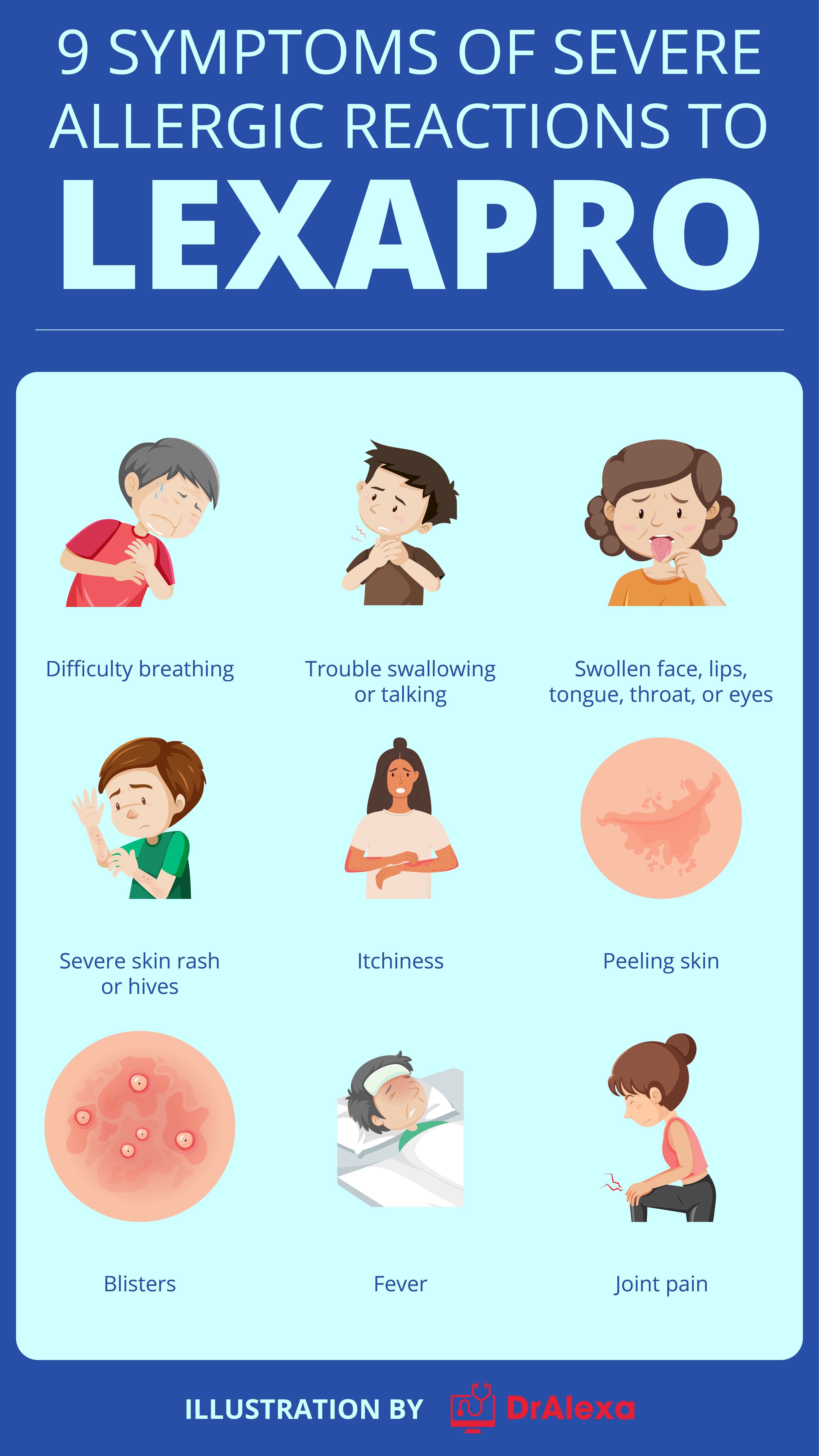Suppose you are battling anxiety, depression, or other mental health conditions. In that case, you may wonder if Lexapro is the proper medication for you. This drug is effective in treating a variety of psychiatric health conditions. Still, it is crucial to understand everything there is to know about it before starting treatment.
If you want to know more about Lexapro, then look at the information below about how it works, its potential side effects, and more.
What Is Lexapro?
Lexapro is a selective serotonin reuptake inhibitor (SSRI). This means that it increases the level of serotonin in your brain by blocking its reabsorption. It is a member of the antidepressant class that effectively treats psychiatric disorders. The precise mechanism of action of this medicine is still unspecified. Still, research has found that this prescription affects serotonin, a neurotransmitter in the brain areas involved in emotions, sleep, and other bodily systems.
One theory also claims that it can help maintain a healthy level of stress hormones. Which can significantly alleviate stress, enhance mood, and promote well-being and happiness. Lexapro is more beneficial and has minimal side effects than some older antidepressant medications, such as monoamine oxidase inhibitors (MAOIs). This is because Lexapro doesn’t interfere with other neurotransmitters. While MAOIs can cause a dangerous build-up of serotonin, SSRIs only target serotonin that’s already present in the brain.
Lexapro Generic Name
Escitalopram is the generic name for Lexapro. This comes from the fact that it is a combination of two different chemicals, citalopram and enantiomers. Like your left and right hand, enantiomers are mirror images of each other. Citalopram is the left-handed version, while escitalopram is the right-handed version. The difference between these two versions is minuscule, but it is enough to make escitalopram slightly more potent than citalopram.
Citalopram was the original chemical compound used in Celexa, another popular antidepressant. When it was time for the patent on Celexa to expire, some laboratories combined citalopram with enantiomers and created Lexapro to extend their product’s life. This is a common tactic in the pharmaceutical industry and has been quite successful. While the patent on Lexapro has now expired, laboratories still manufacture and market the drug in brand-name and generic forms.
What Is Lexapro (Escitalopram) Used For?
Lexapro is prescribed to treat major depressive disorder and generalized anxiety disorder. Your doctor may also prescribe it for other conditions such as panic disorder, binge eating disorder, post-traumatic stress disorder, obsessive-compulsive disorder, and more. This prescription is thought to correct chemical imbalances in the brain that can lead to major depressive disorder and other mental health conditions.
Lexapro also works by increasing levels of the neurotransmitter serotonin or the feel-good chemical in the brain. It is one of the chemicals that transmits messages between nerve cells. It plays a vital role in mood, so increasing its levels can help ease anxiety and treat depression. Lexapro is delivered to work by revising the disproportion levels of serotonin in the head.
What Are the Pros and Cons of Lexapro?
Considering Lexapro, it’s essential to know the potential benefits and risks. Like all medications, Lexapro has pros and cons that you should be mindful of before starting treatment. Therefore, it is vital to consult your doctor before starting or stopping any medication.

Pros
● Lexapro may help to relieve symptoms of depression and anxiety. You may feel more able to perform day-to-day activities and enjoy life more.
● Lexapro can be taken once daily, at any time of day. This may help people who have trouble remembering to take their medication or have side effects that worsen in the morning.
● It can improve sleep quality and duration for some people. Lexapro may be helpful if you have difficulty sleeping due to your anxiety or depression.
● Increased energy levels and improved concentration are other potential benefits. Those who have trouble focusing or completing tasks due to their psychiatric health condition may find that Lexapro helps with these issues.
● Lexapro may help other conditions such as obsessive-compulsive disorder (OCD), panic disorder, and post-traumatic stress disorder (PTSD).
● Generally well tolerated by most people. Lexapro side effects are typically mild and can ease on their own.
Cons
● If you have a history of bipolar disorder, taking an SSRI like Lexapro can trigger mania.
● Lexapro can interact with other medications. Ensure to inform your doctor of all your medications, including over-the-counter drugs, vitamins, and herbal supplements.
● Gastrointestinal problems that cause nausea, vomiting, diarrhea, and constipation are common side effects of Lexapro.
● Sexual side effects like decreased libido, sexual dysfunction, and problems with orgasm are possible side effects of Lexapro.
● Changes in weight and appetite are other potential side effects of Lexapro. Some people may experience weight gain, while others may lose weight.
● Anxiety and agitation may worsen in the first few weeks of treatment with Lexapro and gradually improve.
● Allergic reactions to Lexapro are possible, although rare. Symptoms can include skin rash, hives, difficulty breathing, and swelling of the face or throat.
What Are Lexapro’s Side Effects?
Like any other medication, there are potential side effects associated with the use of Lexapro. By better understanding these side effects, you can be more prepared to manage them if they occur. While these side effects can be discomforting, they are usually mild and go away within a few weeks of starting the treatment as the body adjusts to the presence of the drug. However, if you experience side effects that do not ease or are severe, talk to your doctor about this.
Some of the most common side effects associated with Lexapro are:
Fatigue: Fatigue is a common side effect of Lexapro. It is a feeling of tiredness that is often accompanied by a lack of energy. Fatigue can be caused by many things, including the body’s adjustment to the presence of Lexapro. Therefore, it is vital to take proper rest and exercise while taking Lexapro to help combat fatigue.
Nausea: Nausea is another common adverse effect of Lexapro. It is an uneasiness of the stomach that can sometimes lead to vomiting. Eating small, frequent meals and avoiding spicy or fatty foods while taking Lexapro are essential to help lessen the chances of nausea.
Diarrhea: If you are taking Lexapro, you may experience diarrhea. This is an increase in the frequency of bowel movements or loose stools. It is essential to take plenty of fluids and avoid caffeine while taking Lexapro to help reduce the chances of diarrhea and stay hydrated.
Restless: Feeling tired and restless is discomforting and is a common side effect of Lexapro. Falling or staying asleep can be challenging when you feel restless. Taking a warm bath, meditating, and reading a book before bed may help you relax and fall asleep more easily.
Insomnia: It is difficult to fall asleep or stay asleep. Insomnia can be caused by several things, including the body’s adjustment to the presence of the Lexapro. To help combat insomnia, it is vital to establish a regular sleep schedule and avoid caffeine before bed.
Headache: A headache is also a common side effect of Lexapro. To help relieve headaches, it is crucial to drink plenty of fluids and get enough rest. If you experience a headache that does not go away or is severe, be sure to talk to your doctor about this.
Dry Mouth: Lexapro can cause a feeling of thirst or a sticky sensation in the mouth. It is essential to take a lot of fluids and avoid alcohol while taking Lexapro to help reduce the chances of a dry mouth. With a dry mouth, practicing good oral hygiene is essential by brushing your teeth regularly and avoiding sugary foods.
Anxiousness: Anxiety is a feeling of unease, such as worry or fear. Talking to your doctor about any anxiety you may feel while taking Lexapro is important. They may be able to modify your Lexapro dose or prescribe additional medication to help lessen the anxiety. This side effect usually eases away as the body adapts to the presence of the Lexapro.
Sweating: Hyperhidrosis, generally known as excessive sweating, is a common side effect of Lexapro. It can be embarrassing and uncomfortable. To help reduce the chances of excessive sweating, it is important to wear loose-fitting clothing and avoid strenuous activity while taking Lexapro.

Lexapro for Depression
To understand how Lexapro works, it’s vital first to understand the chemistry of depression. Depression is caused by a chemical imbalance in the brain, specifically in the areas that regulate mood and emotions. These chemicals are neurotransmitters and work by sending messages between nerve cells. When there is an imbalance of neurotransmitters, it can lead to feelings of sadness, anxiety, and hopelessness.
Lexapro works by expanding the levels of serotonin in the brain. Serotonin is a neurotransmitter that helps regulate mood and emotion. By increasing the levels of serotonin, Lexapro can help improve mood and alleviate the symptoms of depression. If you or someone you are familiar with is battling depression, it’s essential to understand the available treatment options, such as Lexapro. Lexapro is acceptable for treating mild to moderate depression and can be taken as an oral tablet or oral solution.
What Does Lexapro Do for Anxiety?
Lexapro can also be prescribed to treat the condition in a variety of anxiety disorders, such as:
● Simple phobia
● Panic disorder
● Social anxiety disorder
● Generalized anxiety disorder
● Post-traumatic stress disorder
● Obsessive-compulsive disorder
Lexapro works by increasing serotonin levels in the brain, which helps improve mood and relieve anxiety. However, it is crucial to note that Lexapro takes several weeks to start working. In addition, it is vital to continue using Lexapro even if you are feeling better.
How Does Escitalopram (Lexapro) Work?
The specific way that escitalopram (Lexapro) works is not fully understood. However, researchers believe escitalopram (Lexapro) binds to particular receptors in the brain (the same ones targeted by other antidepressants). This action helps block the reabsorption of serotonin in the brain, making more serotonin available. Low serotonin levels are linked with depression and anxiety in several different disorders. Escitalopram (Lexapro) works to avoid this drop in serotonin levels and maintain mental balance.
Before You Take Escitalopram (Lexapro)
Before taking Lexapro, there are a few things to keep in mind. First, in doing this, you can avoid any severe side effects of taking the medication.
- Talk to your doctor about all other allergies you may have so that they can determine if Lexapro is proper for you.
- You should also not take escitalopram (Lexapro) if you have taken an MAOI in the past 14 days to avoid any potentially dangerous side effects.
- If you are allergic to escitalopram (Lexapro) or any ingredients in the medication, do not take it.
- Do not take Lexapro if you are pregnant or breastfeeding unless your doctor tells you to.
- You should also avoid alcohol intake while using Lexapro, as it can increase the effects of the medication.
- You should not take Lexapro if you are also taking a MAOI. This could cause a dangerous drug interaction.
- Make sure to inform your doctor about any other medications you are taking, as they may interact with Lexapro. This also includes prescription and over-the-counter medicines, vitamins, and herbal supplements.
Typical Dosing for Lexapro (Escitalopram)
The amount of Lexapro you will be prescribed and take will depend on a few factors. These include your age, the condition being treated, other medical conditions you may have, and other medications you are taking. However, it is still necessary to obey your doctor’s dosage recommendation, even if it does not follow the general dosing information below.
Typical dosages for Lexapro:
Children below 12 years of age
● Children ages 12 and younger will be given a small Lexapro dosage, depending on their doctors. It will be based on weight, and they will typically start with a lower dose of Lexapro, increasing gradually over time.
Children above 12 years of age and adults
● Those above 12 years old will be given a starting dose of 10 milligrams (Lexapro 10 mg) each day that will be taken in the morning or evening. Your doctor may alter this dosage based on how you respond to the Lexapro.
Frequently Asked Questions
If you forget to take the escitalopram (Lexapro) dose, consider taking it as soon as it is possible when you remember, unless it becomes near the time of your next dose.
Do not double your next Lexapro dose or start taking more than just the recommended amount because of a missed dose. Consult your doctor about this to ensure you do what is best for your situation.
There is no specific treatment for trying to reverse the adverse effects of Lexapro. If you overdose on Lexapro, you may require immediate medical attention.
Reach out to your doctor immediately or go to the nearest emergency room. If the person you know has overdosed on Lexapro and has collapsed or is not breathing, call 911 directly.
When taken as prescribed, Lexapro may trigger some changes in your appetite, sleep, and energy within 1 to 2 weeks before full therapeutic effect. This is a standard process with most antidepressants and should not be cause for concern. Improvement in the physical problems can be a crucial early symptom that the Lexapro prescription is working. A depressed mood and loss of interest in tasks may take up to 6-8 weeks to ultimately begin to ease.
Risks and Warnings for Lexapro (Escitalopram)
Lexapro (escitalopram) can have severe side effects and serious health risks. This danger can be even more significant for certain people, especially those with pre-existing health conditions.
Some of the warnings for Lexapro are as follows:
Mania Occurrence
Depression is commonly the initial symptom of bipolar affective disorder. Using an antidepressant alone to treat someone with the bipolar affective disorder can lead to a manic episode. This is much more likely to occur if you or a family member has bipolar disorder. Before taking Lexapro, your provider should ensure that you do not have bipolar disorder. Consult your practitioner as early as possible if you notice any strange changes in your personality.
Serotonin Syndrome
Serotonin syndrome is a condition but possibly fatal circumstance where the brain produces too much serotonin. Too much serotonin causes an immediate heartbeat, perspiration, muscle pain, fever, and frustration. Use Lexapro with other serotonin-lowering medications. Contact your doctor immediately if you are suffering from any of these symptoms of serotonin syndrome.
Withdrawal Symptoms
Sudden discontinuation of Lexapro can influence the outcome of withdrawal symptoms such as nausea, anxiety, agitation, flu-like symptoms, insomnia, and dizziness. These symptoms typically begin within three days of ceasing Lexapro usage. Consult your health professional to determine the slowest but steady and safe way to transition off your Lexapro prescription.
Suicidal Ideas and Actions
Lexapro can increase the probability of suicidal ideation or actions. Keep an eye out for new or rapidly deteriorating depression, suicidal tendencies, or conduct, particularly within the first few months of therapy or when the Lexapro dose is altered. Inform your medical practitioner immediately if you start noticing any unexpected shifts in mood or behavior patterns while on Lexapro.
Increased Risk of Bleeding
Lexapro may increase your risk of hemorrhage or puncture wounds, particularly if you take nonsteroidal anti-inflammatory drugs (NSAIDs) or blood thinners. The bleeding can indeed be fatal. Inform your healthcare provider if you have persistent bruising, black stools, pink or red urine, or unusual nose or gum bleeding. If you take prescribed medication, your practitioner may need to modify your dose.
Interactions With Other Drugs
It is crucial to be informed about possible drug interactions before taking Lexapro, as some drugs can render the medication ineffective. In addition, Lexapro may cause adverse reactions when combined with certain prescription drugs or supplements. Therefore, always notify your doctor and physician of any other treatments or supplements you are currently taking to avoid any potential interactions.
Who Should Not Take Lexapro?
As with any drugs and medications, it is essential to consult a medical professional before taking Lexapro to ensure it is the best treatment option. In addition, Lexapro may not be suitable for everyone, so be sure to talk to your doctor about any concerns you may have. Also, ensure your doctor gets your complete list of allergies, medications, and medical conditions.
Patients with hypersensitivity or allergy to escitalopram oxalate should not take Lexapro. Lexapro is also not recommended for people who are taking MAOIs. Taking MAOIs and Lexapro together can cause serious, even life-threatening, side effects.
Escitalopram Alternatives
You may wonder if any escitalopram alternatives can provide similar relief without the same risk of side effects. There are many Lexapro alternatives available. Some common ones include:
Xanax (alprazolam)
Although this can be used to treat anxiety or panic disorder, it is addictive, and detoxification symptoms can be severe. Xanax is classified as a federally controlled drug because it can be abused and cause dependence. To avoid misuse and abuse, keep this medication in a safe place. This is especially important if you have children or teens in the home. Its half-life of 20 hours can be detected in urine for up to four days.
Clonazepam
Clonazepam is recommended for anxiety, epilepsy, and seizure prevention. This could minimize seizure frequency under certain neurological conditions and can be used for panic disorder, anxiety relief, or general anesthesia in the short term. However, it can lead to addiction and detoxification symptoms upon discontinuation when used for an extended period. In addition, its half-life of 40 hours can be detected in urine for up to eight days.
When Should I use Lexapro?
Many people usually ask when the best time to take Lexapro for anxiety is. Healthcare providers usually recommend taking it in the morning or evening for easy tracking. However, you can use Lexapro at any time of the day as long as you ensure you keep to the same time every day. If you have trouble sleeping, it might be best to use Lexapro in the morning.
Does Lexapro Affect Sodium Levels?
Yes, Lexapro can cause low sodium in the blood (hyponatremia). This condition is more common is elderly patients using water pills for high blood pressure or those with reduced fluid in the body due to severe vomiting or diarrhea. It is best to consult a professional healthcare provider for the best health solutions.
Lexapro vs Zoloft
Lexapro (escitalopram) and Zoloft (sertraline) are selective serotonin reuptake inhibitors (SSRI). The difference between them is Lexapro is suitable for treating depression and anxiety. At the same time, Zoloft is a safe antidepressant used in treating mental disorders like panic disorder, post-traumatic stress disorder, and obsessive-compulsive disorder.
Can I Take Lexapro and Alcohol?
Some people drink alcohol to lift their moods; however, if you are on Lexapro, drinking alcohol may have the opposite effect on you. Alcohol may make your depression worsen and make you feel way more anxious and down than before you took Lexapro. Avoid alcohol when using Lexapro.
When To See a Doctor
If you have anxiety or panic disorder, it is best to see a doctor. They can help you find the proper drug administration for your specific situation. If you believe you may depend on Lexapro, talk to your doctor about it. They can help you wean off Lexapro and find an alternative that is right for you. Withdrawal from Lexapro can be life-threatening, so you must consult a medical professional to find an appropriate dosage and plan to tap off the medication, if necessary, slowly. If you or someone familiar with is experiencing suicidal thoughts, please call 911 immediately.
How Much Does Lexapro (Escitalopram) Cost?
Lexapro (escitalopram) is a generic medication that may be significantly less expensive than the brand-name version. With or without insurance, you may be able to use patient assistance programs to help with the cost of Lexapro. The out-of-pocket cost for Lexapro is around $5.10, 89% off the average retail price of $48.23. This will vary depending on your insurance coverage, pharmacy, and whether you use a generic or brand name version of the drug.
Get a Prescription for Lexapro (Escitalopram) Online
Getting a prescription for Lexapro is easier than ever. After a medical assessment, medically qualified doctors can prescribe Lexapro online. You can speak with online doctors to learn more about Lexapro. Utilize your phone or computer to schedule an online appointment with a licensed physician. In some cases, you may be able to get your recommendation the same day.
Conclusion
It is vital to understand that everyone’s experience with Lexapro will be unique. There are thousands of Lexapro reviews available on the internet. Therefore, working closely with your doctor to find the correct dosage forms and treatment plan is essential. You can make an informed decision about whether or not Lexapro is right for you once you have all the facts. While Lexapro may cause some side effects, many people find that the benefits of taking Lexapro far outweigh any negatives.
https://www.goodrx.com/lexapro/what-is
https://www.drugs.com/compare/escitalopram
https://healthfully.com/54004-lexapro-pros-cons.html
https://www.healthline.com/health/depression/lexapro-side-effects#takeaway
https://www.webmd.com/drugs/2/drug-63990/lexapro-oral/details/list-contraindications
https://www.verywellmind.com/anxiety-treatment-and-lexapro-dosage-and-side-effects





